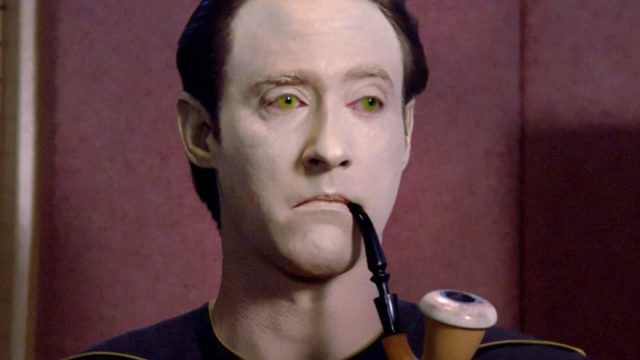Honestly, I was tempted to pick an article image from either of the two other things I know Brent Spiner from. I knew him, if vaguely, before his appearance on Star Trek: The Next Generation. He was, after all, a recurring character on Night Court, which I would watch whenever possible as a child. Though I didn’t see his American Playhouse performance in Sunday in the Park With George until after Next Gen had been on the air for several years.
But that’s where most people know him, even if Star Trek is considered for nerds. He even released an album in 1991 called Ol’ Yellow Eyes Is Back, a reference to Data and those likely quite uncomfortable contact lenses he wore for the character. Data was, I think, an attempt to recreate the magic of Spock. The two aren’t quite the same—and the dynamic is different, surely important—but he’s still a character I quite enjoy, and part of that of course is Spiner’s performance.
I do still like him in the things I’ve seen where he shows emotion, though. Not just things like Warehouse 13, where it’s obviously “let’s cast Data.” Even though he’s good on that, too. But he plays Humourous Redneck Bob Wheeler on Night Court, who ends up buying the newsstand with his family and appearing on the show about as often as Art the Maintenance Guy—less often than the major characters but considerably more often than most of the others. The part is clearly a stereotype, but he’s not just an object of scorn, so that’s something.
Really, though, the one I most seriously considered that wasn’t Data was either of the joint roles of Franz and Dennis from Sunday in the Park With George. The conceit of the show, which is about the painting “Sunday Afternoon on the Island of La Grande Jatte,” is that everyone plays two characters, one in 1884 and one in 1984. As Franz, he is a German servant to a famous artist; as Dennis, he is the engineer who does the tech to produce art. He gets to deliver the line, “I’m going back to NASA. There’s just too much pressure in art.” I love the show, and I love him in it.
There is too much of an impulse to give him All The Emotions as a sort of counter Data. Because it’s funny! But I think that undervalues him, because he’s capable of something much more complicated—a performance of subtle emotional weight. He isn’t given the opportunity much; frankly, he doesn’t get it as Bob Wheeler or as Franz. There’s some of it there in Dennis, though, and I’m given to understand he was a very good John Adams in a recent revival of 1776. It’s another one of those shows that really makes me regret that they don’t make more Broadway available for consumption outside New York.
Help me afford the seasons of Night Court he’s on; consider supporting my Patreon!

